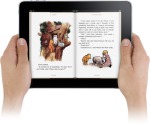While most of us focused on the implications of initiatives like Google Books, we may have overlooked the elephant in the room. The story is not about the future of books but rather how people will consume written content – if at all! Whether you read your book on your Kindle, Ipad or whatever, you are still consuming knowledge the same way your ancestor did: reading one line at the time with 90%+ of your brain activity dedicated to this activity.
Audiobooks were the first real challenge to this very principle. You can consume knowledge while driving your car, moping your floor, etc. While quite prevalent in the American culture, audiobooks did not change the book industry – rather it created a new revenue stream. The matter of the fact is that knowledge consumption remained untouched: still a one-way street.
This is why Paul Carr’s recent review of the IPad in TechCrunch got my attention. Paul makes the interesting argument that the Ipad will not only kill the Kindle but it will also kill “the experience of reading for pleasure.” Why?
“The iPad is emphatically not a serious readers’ device: the only people who would genuinely consider it a Kindle killer are those for whom the idea of reading for pleasure died years ago; if it was ever alive. The people who will spout bullshit like “I read on screen all day” when what they really mean is “I read the first three paragraphs of the New York Times article I saw linked on Twitter before retweeting it; and then I repeat that process for the next eight hours while pretending to work.” That’s reading in the way that rubbing against women on the subway is sex.”His point is that our experience of reading has changed with our attention span. Reading is no longer as entertaining as it used to be; especially on a platform on with awesome games just one click away. The immediate consequence is that you will see more and more video and interactive content integrated in your reading experience. Reading will then become more and more like surfing the Web – a two-way street knowledge consumption. Read the rest of this entry »
